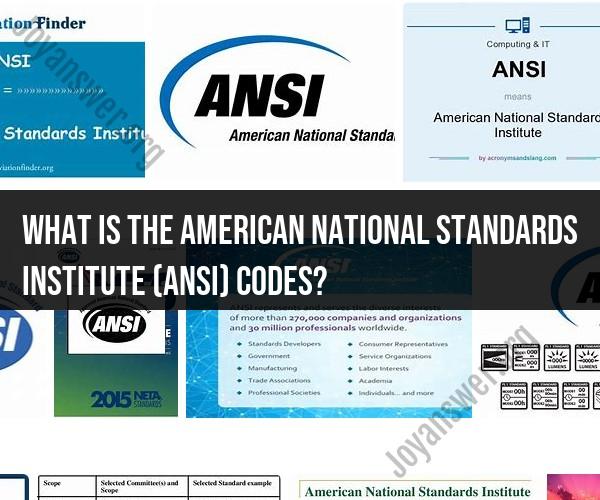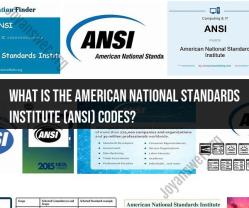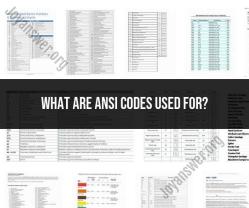What is the American National Standards Institute (ANSI) Codes?
The American National Standards Institute (ANSI) is a private, non-profit organization that coordinates and oversees the development of voluntary consensus standards for products, services, processes, and systems in the United States. ANSI serves as the official U.S. representative to various international standards organizations and plays a central role in facilitating the creation and adoption of standards across a wide range of industries.
Here are some key points about the American National Standards Institute (ANSI) and its role in standardization:
Standardization Authority: ANSI does not develop standards itself but serves as a facilitator and coordinator for the development of standards by various standards-developing organizations (SDOs). These SDOs can be industry associations, government agencies, or other groups with expertise in specific fields.
Voluntary Consensus Standards: ANSI's standards development process is based on the principle of voluntary consensus. This means that stakeholders from relevant industries and interest groups come together to develop standards through a collaborative process. These standards are not imposed by government regulations but are voluntarily adopted by industry participants.
National and International Influence: ANSI is responsible for designating standards as American National Standards (ANS) when they meet certain criteria for openness, balance, and due process. ANSI also represents the United States in international standardization activities through its participation in organizations like the International Organization for Standardization (ISO) and the International Electrotechnical Commission (IEC).
Diverse Industries: ANSI's standards cover a wide range of industries, including manufacturing, construction, information technology, healthcare, energy, telecommunications, and more. These standards can address product specifications, safety guidelines, testing methods, and other aspects of quality and performance.
Accreditation and Certification: ANSI also provides accreditation and certification services to organizations and conformity assessment bodies that evaluate products, services, and management systems against established standards. ANSI accreditation signifies that an organization meets specific quality and competency requirements.
Public Access to Standards: ANSI promotes public access to standards by offering online access to a significant portion of its standards catalog. However, some standards may be subject to copyright or licensing restrictions.
Role in Regulatory Compliance: While ANSI standards are typically voluntary, they may be referenced or incorporated into regulations at the federal, state, or local levels. In such cases, compliance with ANSI standards can be mandatory.
Continuous Updating: Standards often need to evolve to keep pace with technological advancements and changing industry needs. ANSI and its affiliated SDOs regularly review and update standards to ensure their relevance and effectiveness.
In summary, the American National Standards Institute (ANSI) plays a critical role in facilitating the development of voluntary consensus standards that promote safety, quality, and innovation across a wide range of industries in the United States. These standards help establish best practices, improve interoperability, and ensure the reliability of products and services.



